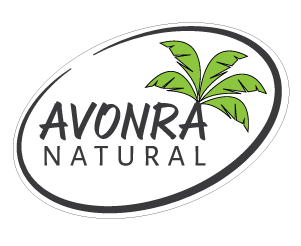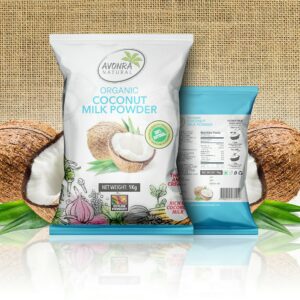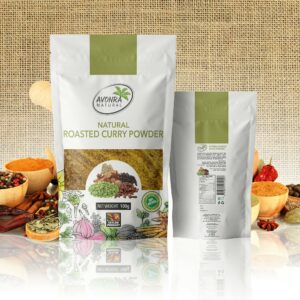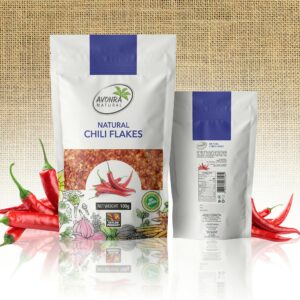Organic Coconut Sugar
Organic Coconut Sugar
Avonra Natural Organic Coconut Palm Sugar (also known as Organic Coconut Sugar) is a rich, unrefined brown sugar with a deep caramel flavour.
How is coconut sugar made?
Avonra Natural Organic Coconut Sugar comes from coconut trees that grow in Sri Lanka also known as “The pearl of the Indian Ocean”. The sap of the coconut tree is harvested from the coconut flowers. The sap is placed in a large wok, heated, and a foam that forms at the top of the liquid is removed. The sap eventually starts to change colour from translucent to a dark brown.
Coconut sugar nutrition facts in 1 teaspoon:
- 15 calories
- 0 g total fat
- 0 mg sodium
- 4 g carbohydrate
- 0 g fibre
- 4 g sugar
- 0 g protein
One teaspoon of coconut sugar contains 15 calories and 4 grams of sugar, which is the same as a teaspoon of sugar cane or white refined sugar.
Benefits of Organic Coconut Sugar
Coconut Sugar has a much lower GI (35) compared to regular sugar (65-70), which makes it an ideal healthier alternative for sugar or sugar syrup. The other main difference of Coconut Sugar is that unlike table sugar it is not filled with so-called “Empty Calories”. It contains trace amounts of vitamin C, magnesium, calcium, potassium, zinc, iron and copper, as well as antioxidants and phytonutrients. So are the befits of using Coconut Sugar.
Other benefits of the organic coconut sugar; iron, zinc, potassium, antioxidants, dietary fibres and a lower Glycemic Index. Although coconut sugar has only recently become popular in the West as a more delicious and healthier alternative to ordinary sugar, coconut sugar has been used as a sweetener for thousands of years in many Southeast Asian countries.
Uses of Organic Coconut Sugar
Coconut sugar is an ideal alternative for Table Sugar. It can be used to create or enhance many desserts and drinks. Since coconut sugar has a darker almost earthy flavour, it’s wonderful in baking recipes using chocolate or warm spices. It’s also brilliant stirred into coffee or tea, sprinkled on top of pancakes or waffles, or used to brighten up savoury recipes like curries, chicken or fish. You can use Coconut Sugar for anything you will use table sugar for, with better results.
Compared with cane sugar, the sugar yield per acre of coconut trees increases by 50% to 75%, but it consumes less than one-fifth of soil nutrients and water, which makes coconut sugar an extremely sustainable product.
What does coconut sugar taste like?
Unexpectedly, coconut sugar does not taste like coconut. The taste is most likely mild caramel. Coconut sugar is light brown and has a texture similar to brown sugar. This sugar substitute can be used for biscuits, cakes and instant bread.
Is coconut sugar better than other types of sweeteners?
Refined white sugar and high fructose corn syrup have undergone extensive processing and are therefore deprived of essential nutrients. However, coconut sugar undergoes very little processing, so it can retain some of its natural vitamins, minerals and antioxidants. Specifically, coconut sugar contains trace amounts of magnesium, potassium, zinc, iron and B vitamins.
Is coconut sugar good for weight loss?
In the final analysis, weight loss comes down to the scientific principles of calorie intake and calorie consumption.
Although coconut sugar contains some nutrients, it is still high in sugar and calories. Even if you buy organic and non-organic coconut sugar, it does not mean that the sugar content in the sugar is lower than ordinary varieties. According to the glycemic index database of the University of Sydney, the glycemic index of coconut sugar is 54, which is not low compared to refined sugar.

![ZZ [Original Size]](https://avonranatural.com/wp-content/uploads/2020/11/ZZ-Original-Size.jpg)
![01 [Max Width 2400 Max Height 1800]](https://avonranatural.com/wp-content/uploads/2020/11/01-Max-Width-2400-Max-Height-1800-4.jpg)
![02 [Max Width 2400 Max Height 1800]](https://avonranatural.com/wp-content/uploads/2020/11/02-Max-Width-2400-Max-Height-1800-4.jpg)
![200g [Original Size]](https://avonranatural.com/wp-content/uploads/2020/11/200g-Original-Size.jpg)



